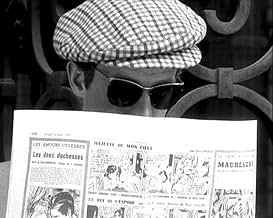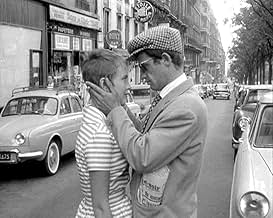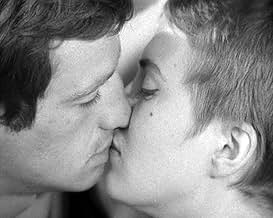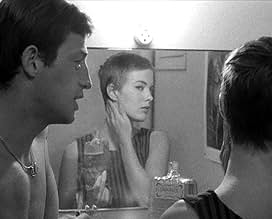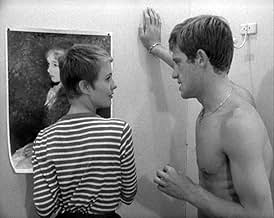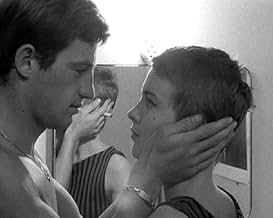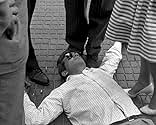Dopo aver rubato un'auto, un ladruncolo uccide d'impulso un poliziotto a bordo di una moto. Ricercato dalle autorità, rincontra una studentessa di giornalismo americana e cerca di persuaderl... Leggi tuttoDopo aver rubato un'auto, un ladruncolo uccide d'impulso un poliziotto a bordo di una moto. Ricercato dalle autorità, rincontra una studentessa di giornalismo americana e cerca di persuaderla a fuggire con lui in Italia.Dopo aver rubato un'auto, un ladruncolo uccide d'impulso un poliziotto a bordo di una moto. Ricercato dalle autorità, rincontra una studentessa di giornalismo americana e cerca di persuaderla a fuggire con lui in Italia.
- Regia
- Sceneggiatura
- Star
- Nominato ai 1 BAFTA Award
- 5 vittorie e 4 candidature totali
- Michel Poiccard a.k.a. Laszlo Kovacs
- (non citato nei titoli originali)
- Patricia Franchini
- (non citato nei titoli originali)
- Tolmatchoff
- (non citato nei titoli originali)
- Police Inspector Vital
- (non citato nei titoli originali)
- Photographer
- (non citato nei titoli originali)
- A Journalist
- (non citato nei titoli originali)
- Man in a White Car
- (non citato nei titoli originali)
- A Drunk
- (non citato nei titoli originali)
- A Journalist
- (non citato nei titoli originali)
- Liliane
- (non citato nei titoli originali)
- …
- Police Inspector #2
- (non citato nei titoli originali)
- The Snitch
- (non citato nei titoli originali)
- Carl Zubart
- (non citato nei titoli originali)
- Antonio Berrutti
- (non citato nei titoli originali)
- A Journalist
- (non citato nei titoli originali)
- Journalist at Orly
- (non citato nei titoli originali)
Recensioni in evidenza
Self reflexive to the point that it not only acknowledges its own existence, it revels in it.
All style and no substance is considered a bad thing today, unless its Tarantino. Well, if it wasn't for Godard, chances are there would be no QT.
All the characters and images, and dialogue and sets are constructed from all aspects of life - Michel is a Bogart collage. Patricia apes everything she sees, from her Interviewee's facial gestures to Michel's own.
Don't let all this technical mumbo fool you, I did my thesis on Godard and would happily bore the ass off you with a lecture in great detail about this film, but the fact is, it's a stormer.
Grips you by the throat and shakes the hell out of you, and it doesn't let go until the final breath.
Fantastically, artistically magnificent. If Godard wanted to make his debut picture to show how well he understood American ideals and the history of cinema, he couldn't have made a better picture.
Top stuff French guy.
The most important thing this film is remembered for is it's general disregard for the so called "rules" of filmmaking. It boasts groundbreaking cinematography, introducing the "Jump Cut" to make the film's pacing more kinetic. The other most notable aspect of this film is its dialogue: natural, yet almost poetic in its delivery.
The two leads are very charming, especially Belmondo's Michel. His suave demeanor and charismatic presence steals whatever scene he's in. Jean Seberg's turn as Patricia is more subtle and nuanced, making her role the more complex of the two, even if it's not as entertaining as Belmondo's performance.
As I have stated earlier, this is not a film that is concerned with plot as much as it is feel. Director Jean-Luc Goddard was trying to do something new for the cinema world, and succeeded in doing so. "Breathless" is a must see for any cinephile due to its long term impact on film as a medium.
8.5/10.
I'm only stating this because around a year and a half ago, I began my sporadic voyage into the depths of Godard with his most recent picture, at the time, Film Socialisme, which I found to be an assault on every conceivable sense and not in a particularly good way. The film was choppy, disjointed, messy, just about as incomprehensible as it could be, and trying to find justifications or analyses online proved ineffective. All and all, it's a film I just want to forget and I didn't care to dive into Godard much after that endeavor. I now realize that a decent part of the blame is on me for choosing perhaps the wrong film to begin my Godardian journey with. I emerge from seeing Breathless (known by its French title as À bout de soufflé) with a more of a positive reaction. This is a bravely-structured and maturely handled annihilation to every cinematic convention prior to its 1960 release down with class and impenetrable style on part of Godard.
The story - even though it is relatively the least of our concerns - follows Michel (Jean-Paul Belmondo), who is trying to emulate the characteristics possessed by Humphrey Bogart during the particular 40s/50s era of menacing American crime dramas that billed him as the lead actor. One day, feeling intimidated and a perhaps a little adventurous, Michel shoots a police officer who has been tailing him and now must deal with being broke and on the run from the cops. His only companion is Patricia (Jean Seberg), an American journalist getting by in life by selling newspapers in downtown Paris. The two desperately skim through their options trying to hide from the police, one of which is skipping town and going all the way to Italy as fugitives.
I say the story is the least of our concerns because there is simply not much to it. After all, Breathless is an aesthetic breakthrough rather than a narrative one. Godard employs dangerously subversive jump cuts - where the camera cuts to another shot within the same frame creating a breach in continuity - along with rapid-fire, quick shots and lengthy dialog scenes. All of this broke French cinema convention, which, prior to this, was consistently polished and very elegant. Godard invited in a rebellious messiness to the picture, almost like the guy coming into a neatly-organized room and rustling all the papers and files to not only create a stir but to do something different, something completely new.
It's almost shortchanging to simply say that I have immense respect for Godard seeing as in 1960, a time when social change and civil unrest amongst adolescents and twentysomethings seemed to be so prevalent in many different places, he ushered in a new way of doing things cinematically and created a stylistically bold film because of it. He even threw in the element of using a hand-held camera, an unheard of practice during this particular time. I think I would also be in line to compare Breathless to Bonnie and Clyde, a film that would enter the picture seven years later in American studios that would simultaneous shock and stimulate audiences everywhere.
Godard's films have a unique power after you watch them. For example, it has been about four days since I sat down to watch Breathless and since watching it - and now writing a medium-length analysis of it - I have a strong, biting urge to watch more of Godard's films. His films have the kind of impact where you just want to talk about them and talk about their impact in great length; which, once more, brings me to the point that watching the films is actually the weaker part compared to discussing them.
Starring: Jean-Paul Belmondo and Jean Seberg. Directed by: Jean-Luc Godard.
Lo sapevi?
- QuizDespite reports to the contrary, Jean-Luc Godard did not shoot the film without a script; however, he did not have a finished script at the beginning, instead writing scenes in the morning and filming them that day. See also Il bandito delle 11 (1965).
- BlooperDuring street shots, countless passersby look at Patricia and Michel and stare into the camera, revealing that the shots were made without filming barriers and simply used street pedestrians in place of extras.
- Citazioni
Patricia Franchini: What is your greatest ambition in life?
Parvulesco: To become immortal... and then die.
- ConnessioniEdited into Pariz pripada nama! (2016)
I più visti
Dettagli
- Data di uscita
- Paese di origine
- Lingue
- Celebre anche come
- Sin aliento
- Luoghi delle riprese
- 11 rue Campagne Première, Paris 14, Parigi, Francia(on location)
- Aziende produttrici
- Vedi altri crediti dell’azienda su IMDbPro
Botteghino
- Budget
- 400.000 FRF (previsto)
- Lordo Stati Uniti e Canada
- 414.173 USD
- Fine settimana di apertura Stati Uniti e Canada
- 32.424 USD
- 30 mag 2010
- Lordo in tutto il mondo
- 596.100 USD
- Tempo di esecuzione1 ora 30 minuti
- Colore
- Mix di suoni
- Proporzioni
- 1.37 : 1





